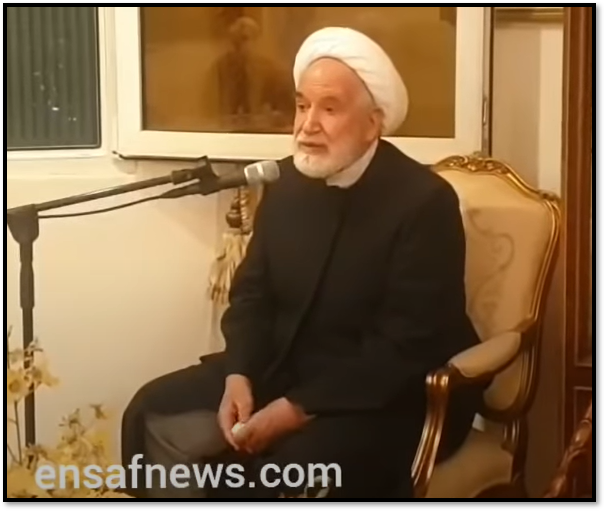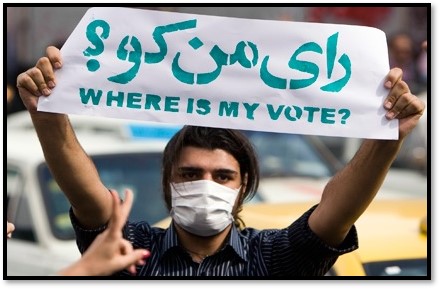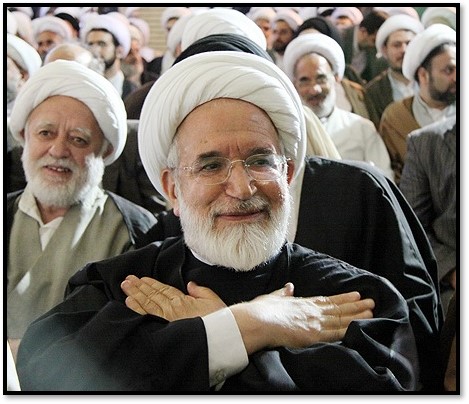
In his first public speech after 10 years under house arrest, opposition leader Mehdi Karroubi urged major reforms to eliminate the “flaws and shortcomings” in the Islamic Republic. Karroubi, a former speaker of parliament who ran for the presidency in 2009, was allowed to give a brief speech to a small group of reformists in an unusual break from his isolation by the government.
Karroubi and former Prime Minister Mir Hossein Mousavi have been under house arrest since 2011 for their roles in the opposition Green Movement. Karroubi and Mousavi ran for president against incumbent Mahmoud Ahmadinejad in the 2009 election. The two became symbolic leaders of millions of Iranians who turned out in cities across the country to challenge the disputed election results. Hardliners labeled them traitors and seditionists.
Karroubi spoke at the home of Gholamhossein Karbaschi, a former mayor of Tehran and head of the Executives of Construction party who was jailed in 1999 on corruption charges and later amnestied. Karroubi thanked the authorities for allowing him to attend the mourning ceremony commemorating the death of the Prophet Mohammed and the martyrdom of his grandson, Hassan ibn Ali, a leading figure in early Shiism. Karroubi’s eight-minute address was posted a video of the event on October 4 by Ensaf News.
The Green Movement
In the election on June 12, 2009, Karroubi came in fourth place –after Ahmadinejad, Mousavi, and former Revolutionary Guards commander Mohsen Rezaie-- with less than one percent of the vote. The interior ministry declared Ahmadinejad the winner with 63 percent of the vote and Mousavi the runner up with 34 percent. The next day, hundreds of thousands of people took to the streets of Tehran to protest alleged vote fraud. The protests quickly spread nationwide. People carried banners declaring, “Where is my vote?” Riot police and Basij paramilitary forces violently suppressed the demonstrations; government snipers shot at unarmed protestors.

The opposition was dubbed the Green Movement because of the green sash worn by Mousavi. (It was reportedly given to him by Mohammad Khatami, the reformist leader who was president from 1997 to 2005.) The Green Movement umbrella held sporadic protests in major cities into February 2010 as demands escalated. Demonstrators increasingly challenged the system and Supreme Leader Ayatollah Ali Khamenei. “Death to the dictator” was a common chant.
Between June 2009 and February 2010, security forces killed at least 100 protesters were and arrested some 4,000. More than 100 key members of the movement were charged with undermining national security and were sentenced to prison terms in Stalin-esque trials. The government crackdown eventually led the movement to call off a demonstration planned for the anniversary of the Islamic Revolution on February 11, 2010. It then stopped mobilizing mass demonstrations.
Arrest
In February 2011, during the Arab Spring uprisings across the Middle East, Mousavi and Karroubi called for demonstrations in solidarity with protests in Egypt and Tunisia. On February 10, Karroubi’s website reported that he had been placed under house arrest. Mousavi and his wife, Zahra Rahnavard, were also placed under house arrest. On February 14, thousands of Karroubi and Mousavi supporters rallied in Tehran. Two people died in clashes with security forces, and some 1,500 were reportedly detained.
Conservative lawmakers called for the trial and execution of the opposition leaders, but neither man was ever formally charged. They remained under house arrest during the rest of Ahmadinejad’s second term. President Hassan Rouhani, who held office between 2013 and 2021, repeatedly pledged to work on easing restrictions on the two former leaders, but they remained under house arrest. Karroubi, who was born in 1937, and Mousavi, who was born in 1942, were early revolutionaries. Both have had serious health issues in recent years. Karroubi’s speech is the first time either man has allowed to speak publicly. The following is a timeline of notable events.
Timeline
1960s and 1970s: Karroubi, a cleric who studied in seminaries in Qom and at the University of Tehran, was imprisoned multiple times under the shah. He was a dissident and follower of revolutionary leader Ayatollah Ruhollah Khomeini; he distributed the banned writings of Khomeini and visited him in exile in Iraq. He was an activist in the 1979 revolution. He organized local committees that distributed food and supplies to protestors and people on strike.
1981-1989: Karroubi headed the Martyr’s Foundation, which provided social services to veterans and families of casualties of the revolution and the 1980-1988 war with Iraq.
1984: Karroubi was first elected to parliament.

1989-92: Karroubi served as speaker of parliament.
2000-2004: He again served as speaker of parliament.
June 2005: Karroubi ran for president and came in third place, after Hashemi Rafsanjani and Mahmoud Ahmadinejad. Ahmadinejad won the runoff against Rafsanjani.
June 2009: Karroubi ran for president again. He came in fourth place, according to the interior ministry. But the results were widely disputed.
Feb. 10, 2011: Karroubi’s website reported that he was placed under house arrest.
Dec. 3, 2011: Karroubi was granted a 30-minute visit with his family, only the third time had been allowed to see family members since his arrest.
May 13, 2013: During his presidential campaign, Hassan Rouhani promised to work to free Karroubi, Mousavi and all others detained after the 2009 election. “I don’t think it will be difficult to bring about a condition in the next year where not only those under house arrest but also those who have been detained after the 2009 election will be released,” Rouhani said.
April 9, 2016: Karroubi published an open letter to President Hassan Rouhani asking for a court hearing. He had not been formally charged with a crime. “I am not asking you to lift my house arrest, nor do I believe that it is in your power to do so. But according to the responsibility assigned to you by the people and the constitution, I want you to ask the despotic regime to grant me a public trial based on Article 168 of the constitution, even if the court is constructed the way that the potentates want,” he wrote. “It will show which side continues in the path of the revolution and is honorable.”
Aug. 6, 2017: Karroubi’s family announced that Karroubi had been given a pacemaker because of heart problems.
Aug. 16, 2017: Karroubi began a hunger strike to demand that an open trial and the removal of security agents from his home. “He does not expect a fair trial, but wants it to be public and would respect the verdict,” Karroubi’s wife Fatemeh told Saham News, the official website of his reformist political party.
Aug. 17, 2017: Karroubi was admitted to a hospital for high blood pressure. His son later confirmed that he ended the hunger strike after the security agents left his residence.
Jan. 29, 2018: Karroubi issued rare criticism of Supreme Leader Ayatollah Ali Khamenei in an open letter. “You have been Iran’s top leader for three decades, but still speak like an opposition,” Karroubi wrote in a letter published by Saham News.
Karroubi rebuked elites for corruption and mismanaging the economy at a time 10 million Iranians lived in poverty. “More than 50 percent of the country's wealth is in the hands of state bodies over which there is no supervision.” He chided Khamenei for allowing the Revolutionary Guards to have a major role in the economy.
May 8, 2018: During his campaign for reelection, Rouhani implicitly challenged the judiciary over the detention of Karroubi and Mousavi. "Why have you confined to their houses our dear personalities who were of service to this nation... who showed Iran's real image to the world? Under what law?" Rouhani asked at a rally. “We will go to the ballot boxes on May 19 to bring back our noble men to society.”
July 28, 2018: Karroubi’s son, Hossein, told an opposition website that he heard that the Supreme National Security Council was willing to release the Green Movement leaders from their house arrest.
Dec. 30, 2018: Judiciary spokesperson Gholam Hossein Mohseni Ejei claimed that Karroubi’s 2009 presidential campaign had received financial support from Saudi Arabia and other Gulf countries. “There were signs pointing to it from the intelligence community as well as information from some of our own colleagues (in the judiciary),” Ejei said in an interview with Fars News Agency.
Karroubi’s son, Mohammad Taghi Karroubi, denied the claims. “Allegations of financial assistance to the Karroubi, or Mousavi, presidential campaigns are absolutely false, just like all the other allegations for which no evidence has been presented,” he told the Center for Human Rights in Iran on Jan. 5, 2019.
August 2019: Supreme Leader Khamenei reportedly rejected the release of Karroubi and Mousavi when President Rouhani raised the issue.
October 2021: In his first public appearance in a decade, Karroubi called for reforming the Islamic Republic. “God willing, the path created by the Imam [Khomeini] will continue, the basis of the system will be preserved, and God willing, its flaws and shortcomings will be eliminated,” he told a small gathering of mostly reformist leaders at the home of Gholamhossein Karbaschi, a former mayor of Tehran and head of the Executives of Construction party.
